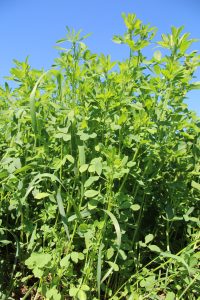Winterkill Alfalfa
The question as to if alfalfa is going to survive the winter or not has probably more to do with the plant itself than the actual weather conditions during the winter.
Alfalfa begins the process for surviving the winter actually during the fall when the temperatures are in the 50s during the day and near freezing during the night. This triggers the crowns on the plant to break down the starches into sugars-a natural antifreeze. This process hardens the crown as well so that ice crystals form on the outside, instead of the inside. If this process doesn’t occur, the plant is vulnerable to winterkill.
Below are some of the causes of this system break down:
1. The stand is old.
Old stands do not process the starch into sugars as well as younger plants.
2. Fertility and pH are poor.
Alfalfa needs good fertility-especially potassium and proper pH levels to develop the sugars that are needed.
3. The stand was aggressively harvested.
The more aggressively harvested the alfalfa is-especially in the fall, the less time the starches and sugars have time to recover.
4. There was a drought during the late summer.
Droughts dehydrate the plant, making the transference of the sugars poor.
5. Snow cover was poor and/or there was plenty of ice during the winter.
Snow cover insulates the plant, but ice will smother the natural respiration of the plant.
6. There was a lot of heaving as the frost came out.
Heaving will break the crown of the plant and kill it.
A few years ago, with a dry summer, ice in December and a long winter-the alfalfa killed out. This year, except for the lack of snow cover-not as much risk.
